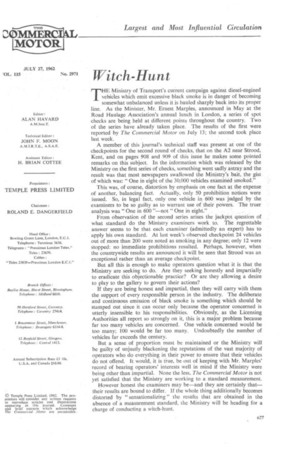Witch-Hunt
Page 35

If you've noticed an error in this article please click here to report it so we can fix it.
THE Ministry of Transport's current campaign against diesel-engined vehicles which emit excessive black smoke is in danger of becoming somewhat unbalanced unless it is hauled sharply back into its proper line. As the Minister, Mr. Ernest Marples, announced in May at the Road Haulage Association's annual lunch in London, a series of spot checks are being held at different points throughout the country. Two of the series have already taken place. The results of the first were reported by The Commercial Motor on July 13; the second took place last week. .
A member of this journal's technical staff was present at one of the checkpoints for the second round of checks, that on the A2 near Strood, Kent, and on pages 908 and 909 of this issue he makes some pointed remarks on this subject. In the information which was releaSed by the Ministry on the first series of checks, something went sadly astray and the result was that most newspapers swallowed the Ministry's bait, the gist of which was: "One in eight of the 30,000 vehicles examined smoked."
This was, of course, distortion by emphasis on one fact at the expense of another, balancing fact. Actually, only 50 prohibition notices were issued. So, in legal fact, only one vehicle in 600 was judged by the examiners to be so guilty as to warrant use of their powers. The truer analysis was "One in 600 "—not "One in eight."
From observation of the second series arises the jackpot question of what standard do the Ministry examiners work to. The regrettable answer seems to be that each examiner (admittedly an expert) has to apply his own standard. At last week's observed checkpoint 24 vehicles out of more than 200 were noted as smoking in any degree; only 12 were stopped: no immediate prohibitions resulted. Perhaps, however, when the countrywide results are announced it will be seen that Strood was an exceptional rather than an average checkpoint.
But all this is enough to make operators question what it is that the Ministry are seeking to do. Are they seeking honestly and impartially to eradicate this objectionable practice? Or are they allowing a desire to play to the gallery to govern their actions?
If they are being honest and impartial, then they will carry with them the support of every responsible person in the industry. The deliberate and continuous emission of black smoke is something which should be stamped out since it can occur only because the operator concerned is utterly insensible to his responsibilities. Obviously, as the Licensing Authorities all report so strongly on it, this is a major problem because far too many vehicles are concerned. One vehicle concerned would be too many; 100 would be far too many. Undoubtedly the number of vehicles far exceeds the century.
But a sense of proportion must be maintained or the Ministry will be guilty of unjustly blackening the reputations of the vast majority of operators who do everything in their power to ensure that their vehicles do not offend. It would, it is true, be out of keeping with Mr. Marples' record of bearing operators' interests well in mind if the Ministry were being other than impartial. None the less, The Commercial Motor is not yet satisfied that the Ministry are working to a standard measurement.
However honest the examiners may be—and they are certainly that— their results are bound to differ. If the whole thing additionally becomes distorted by " sensationalizing " the results that are obtained in the absence of a measurement standard, the Ministry will be heading for a charge of conducting a witch-hunt.
































































































































